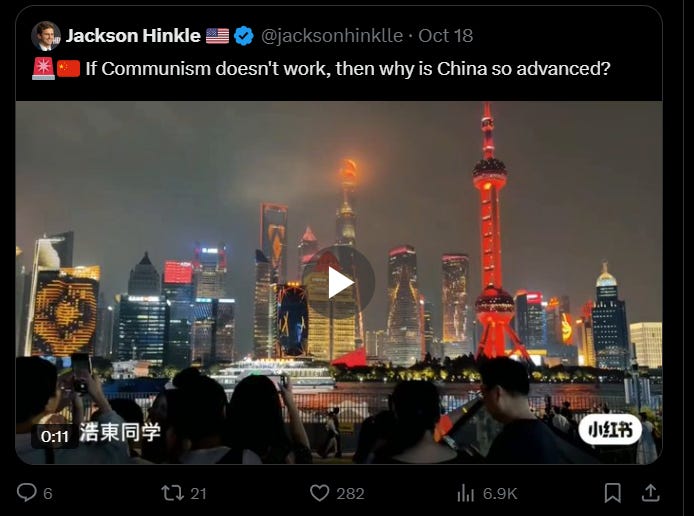The Myth of China’s Communist Success
Prosperity Through Markets, Not Marx
1. The Claim
“If Communism doesn’t work, then why is China so advanced?”
This viral assertion is rhetorically clever but conceptually incoherent. It equates China’s modern skyline with the success of Communism, when in fact those towers were built atop the ashes of it.
2. The Reality: State Capitalism, Not Communism
China is ruled by the Communist Party but operates a capitalist economy in every practical sense. Since Deng Xiaoping’s reforms beginning in 1978, China has permitted private ownership, foreign investment, competitive markets, and profit incentives. Roughly two-thirds of its GDP now comes from the private sector. The state retains political control, but the economic model is authoritarian capitalism, not socialism.
Communism—in the Marxist sense—abolishes private property, markets, and profit. China has none of those prohibitions. Its leaders retained the label but discarded the ideology. The flag stayed red; the economy turned green.
3. Historical Context: Mao vs. Deng
Maoist Era (1949–1976): Command economy, collectivized agriculture, and industrial central planning. The results were catastrophic—tens of millions dead in the Great Famine and near-total stagnation.
Reform Era (1978–1992): Deng introduced market mechanisms under the euphemism of “Socialism with Chinese characteristics”—a polite phrase for capitalism under one-party rule.
China’s economic miracle began not when it implemented communism, but when it abandoned it.
4. The Fallacy of Equivocation
Hinkle’s argument commits a classic equivocation: using the same word (“Communism”) to mean two different things—a political system and an economic system. China is communist in its governance, capitalist in its production. To say its advancement vindicates communism is like saying Britain proves monarchy works because it still has a king.
5. The Actual Drivers of Chinese Advancement
Labor and Urbanization: Hundreds of millions moving from farms to factories.
Export-led Growth: Integration into global trade via WTO accession in 2001.
Foreign Direct Investment: Capital and technology inflows from the West.
Infrastructure Megaprojects: Massive, state-backed industrial investment.
Strategic Planning: Central coordination for industrial policy, not egalitarian redistribution.
These are not communist successes. They are capitalist mechanisms administered by an autocratic state.
6. The Philosophical Point
Communism cannot claim credit for China’s skyscrapers any more than feudalism can claim credit for the internet. The Party preserved its name but reversed its principles. What survives in China is not Marxism, but authoritarian pragmatism —a technocratic will to power, willing to adopt any tool that works.
7. The Verdict
China’s advancement is evidence of how little Communism remains, not how well it works. Communism failed so completely that even China stopped pretending to believe in it. The skyline of Shanghai is a monument not to Communism’s triumph, but to its quiet burial.
The correct inference is the inverse of the meme:
China became advanced to the extent that it abandoned Communism.



